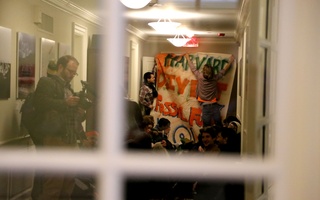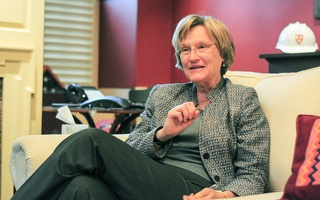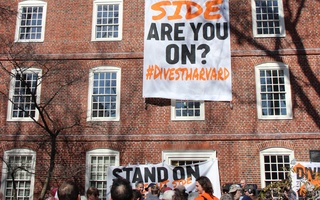UPDATED: April 10, 2014, at 6:59 p.m.
More than 100 faculty members from across the University signed an open letter on Thursday urging University President Drew G. Faust and members of the Harvard Corporation, the University’s highest governing body, to divest the University's endowment from fossil fuel companies.
Citing evidence of global climate change and its destructive potential, the letter reads, “Our sense of urgency in signing this Letter cannot be overstated.”
“Divestment is an act of ethical responsibility, a protest against current practices that cannot be altered as quickly or effectively by other means,” the faculty members wrote. It continues, “If the Corporation regards divestment as ‘political,’ then its continued investment is a similarly political act, one that finances present corporate activities and calculates profit from them.”
The letter, which gained more signatories as the day progressed, comes on the heels of a campus-wide email from Faust on Monday announcing that the University had signed on to the United Nations-backed Principles for Responsible Investment, a framework for investing with environmental, social, and governance issues in mind that also focuses on influencing the behavior of portfolio companies.
Despite offering a number of new climate change initiatives in addition to the PRI standards, Faust’s email reaffirmed the decision, first announced in Oct. 2013, that the University would not divest.
Thursday’s letter from members of the faculty takes aim at that stance, and in particular what those members call the University’s vague strategy of focusing on influencing corporate behavior rather than divesting.
“How, exactly, will the University ‘encourage’ fossil fuel corporations in ‘addressing pressing environmental imperatives’? Will Harvard initiate or support shareholder resolutions?” the faculty members asked.
The letter casts doubt on Faust's assertions that divestment would negatively affect the University’s financial position.
“The President’s statements claim that while Harvard owns a very small fraction of these stocks representing a small fraction of its endowment, the University will exert greater influence if it continues to hold these shares than if it openly divests,” reads a summary of the letter. “This indicates a misunderstanding of the purpose and goals of divestment, and ignores the lessons of the past.”
Rather, the authors assert, the University has an “ethical responsibility” to divest “to expose corporate attitudes and change corporate behavior.”
“We the undersigned are faculty and officers of the University, many with knowledge and research in climate science, energy, business management, ethics, and the effects of climate change on health, prosperity, and biodiversity,” they wrote.
According to University spokesperson Kevin Galvin, Faust’s focus will remain on the initiatives she laid out in her written statements to “ advance the endowment’s paramount aim of supporting Harvard’s academic mission.”
“President Faust recognizes that how best to respond to the threat of climate change is a question on which thoughtful people hold differing views,” Galvin wrote in an emailed statement to The Crimson on Thursday afternoon.
One of the letter’s four principal authors, James M. Recht, an assistant psychiatry professor at the Medical School, said that he had been convinced over the past several months that climate change was a “bona fide public health emergency.”
Read more in University News
Ecuadorian President Downplays Controversy, Highlights Country’s Successes at JFK Forum

















